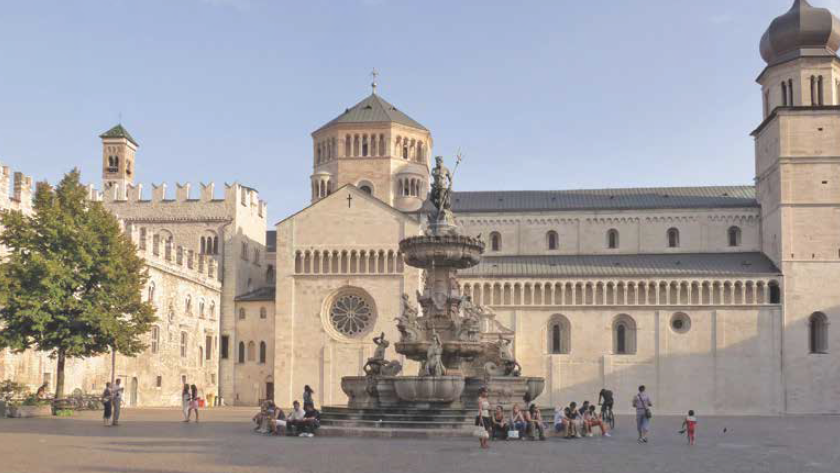Yes, Forever: A total gift of self, the name “Chiara,” a choice of God who is love, and understanding God’s will

The cathedral of Trent in the heart of the city offered Chiara Lubich many moments of inspiration.
The beginnings of the Focolare are linked to the total and decisive “yes” that Chiara Lubich declared to God on December 7,1943.
Fr. Casimiro Bonelli, then director of the Franciscan tertiaries in Trent, went to speak about St Francis to the teachers working in the orphanage of Cognola, just outside the city. He was struck by the reaction of Silvia Lubich: “Father I have never heard things like this. I too want to have this fire of love. I want to take it into the world.”
He later described the scene. “I went back to the orphanage to preach several times and, seeing her enthusiasm, I entrusted some young people to her guidance.”
Silvia entered the Franciscan Third Order and took the name Chiara. When she asked Fr. Casimiro if she could give herself “completely to God,” he tried to make her aware of the consequences, but she remained firm in her decision. Her consecration to God took place on December 7, 1943.
She shared on the 30th anniversary of this day: “I got up at 5am in the morning. I put on my best dress, even though it wasn’t particularly special, and I set out to cross the city and reach a small school …
“A storm was raging so fiercely that I had to push my umbrella in front of me just to be able to keep walking. I read into this fact that the action I was about to take would be met with obstacles. The rain and strong winds were like a symbol of someone or something opposing me …
“When I made it inside the church I found it beautifully decorated. In the background there was a large statue of Mary Immaculate.
“In front of the altar, behind the altar rail, a kneeler had been placed with care … Just before receiving the Eucharist, I realized in a flash what I was about to do: through my consecration to God, I had crossed a bridge, and now that bridge had collapsed behind me. I could no longer go back into the world.
“Yes, because my consecration wasn’t simply the expression of the formula that I read in front of Jesus in the Eucharist when the host was raised up in front of me: ‘I pronounce a vow of perfect and perpetual chastity’. It was something else. I was getting married. I was marrying God.”
At that time Chiara tutored Dori Zamboni in preparation for college. Remembering those days, Zamboni shared in an interview in 2001, “That morning I arrived at Chiara’s house as usual and I waited for her to come for one of my lessons,” she said. “When she arrived, I saw she was bursting with joy. Truly her face was radiant with an indescribable happiness.”
A few weeks later, Chiara attended midnight mass with her friends, who noticed she was crying. Afterwards Chiara explained to them that consecrating herself to God had been a free act. Yet the idea of renouncing her own will, not knowing what that might entail, and that it could even mean entering the cloister, this realization troubled her, since she did not actually feel called to that.
Through her tears she had managed to respond, “If God is asking this of me then I accept it.”
She explained this experience to the friar, but he was quick to assure her fervently, “No, Chiara, this is not what God is asking of you.” And Chiara realized that “one can become a saint while living in a so-called ‘state of perfection,’ but one can also reach holiness of life in the perfection of one’s own state, that is, by doing well whatever God is asking of you, even if it might seem less beautiful than what someone else is doing, or than what you would like … What matters is the will of God.”
Dori, remembering that moment, repeated Chiara’s gesture of throwing her arms open and saying, “I knew in that moment that we possessed a key to holiness of life that we could offer to the whole world.”
Exactly a month later, on January 24, 1944, Fr. Casimiro asked Chiara what, according to her, was Jesus’ greatest suffering. He later admitted that he never really knew what made him ask it.
Chiara made a few suggestions, but he specified that it was when Jesus had cried out: “My God, my God, why have you forsaken me?” (see Mt 27:46, Mk 15:34). For Chiara this was “a revelation and a calling.”
Linked to her vow of December 7, 1943 was also a promise: not to leave the city. She would feel the full weight of that commitment on May 13, 1944. After their family home was badly damaged by bombings, the Lubichs were forced to evacuate. Chiara however had promised to stay in Trent. A small house, which by a stroke of luck she and her friends soon found, became the first “focolare.”












